Beyond the Khyber Pass
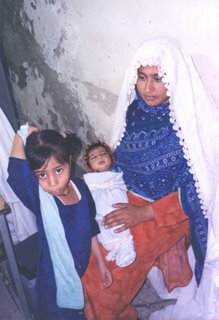 In July, a group of us from the Society of Rural Physicians of Canada (SRPC) learned we had secured a two year grant from the Canadian Society of International Health for HIV/AIDS and gender training in Pakistan. We were bouncing-off-the-walls, cavorting-in-the-streets thrilled! Our Pakistani partners are a non governmental group (NGO), called Frontier Primary Health Care (FPHC), working in North West Frontier Province near the Khyber Pass.
In July, a group of us from the Society of Rural Physicians of Canada (SRPC) learned we had secured a two year grant from the Canadian Society of International Health for HIV/AIDS and gender training in Pakistan. We were bouncing-off-the-walls, cavorting-in-the-streets thrilled! Our Pakistani partners are a non governmental group (NGO), called Frontier Primary Health Care (FPHC), working in North West Frontier Province near the Khyber Pass.Frontier Primary Health Care traces its roots back to an Austrian NGO which responded to the massive influx of more than 3 million Afghan refugees into Pakistan in 1981. Most of the refugees were Pustoo-speaking Pathans who shared their ethnic background with people living in North West Frontier Province and so were resettled there.
FPHC began, as most refugee groups do, with a focus on emergency and curative services in three smaller, rural camps sheltering 30,000 people. Gradually they were able to shift the
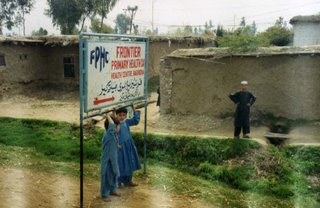 emphasis to a public health model stressing maternal and child health, health promotion and disease control measures. They did such a great job that within ten years the health parameters in the camps were better than those of the Pakistanis who lived in the countryside surrounding the camps.
emphasis to a public health model stressing maternal and child health, health promotion and disease control measures. They did such a great job that within ten years the health parameters in the camps were better than those of the Pakistanis who lived in the countryside surrounding the camps.This was quite an accomplishment because infant mortality (deaths in children under one year of age) and maternal mortality (deaths of women in childbirth) were among the highest in the world, female literacy in the refugees was only 4% and rigorous purdah is still practiced.
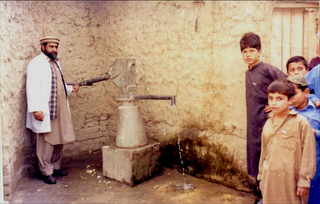
FPHC succeeded by introducing immunization, providing nutrition education, training traditional midwives, establishing oral rehydration centers for treatment of diarrhea and bringing antenatal care and the other basics of the Primary Health Care approach to the families in the camp. Because the refugee camps are constructed of adjoined mud and wattle structures, it was also possible to introduce rudimentary sanitation and piped water to the camps fairly inexpensively.

Over time FPHC has extended their services to communities of Pakistanis in the areas surrounding the original camps. Currently they serve a population of approximately 200,000. They provide a full complement of Primary Health Care services, which while basic, are effective in reducing deaths and preventing disease. One important exception is water and sewage coverage. While 100% of refugees have access to clean water and sewage, less than 60% of the Pakistani population, who live more dispersed across the countryside, have ready access. Apart from vaccines and TB drugs, which are provided by donors, FPHC health services are provided at a cost of 90 Rupees or $1.50 USD per person per year.
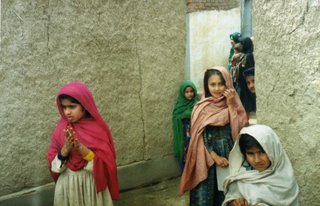
With 200 employees, Frontier Primary Health Care now runs ten health units, three educational facilities providing literacy and skill training for young girls, an Essential Obstetric Unit and a Health Training Unit.
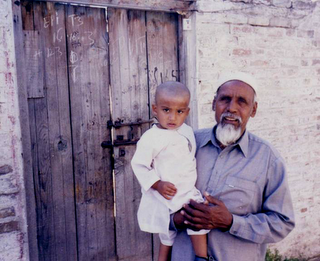
There are reasons for their remarkable success. Among them is the fact that they have an army of more than 500 active volunteers both male and female. Equally important, they focus on health education for community and religious leaders, youth and women as well as for health workers. Yet another, that they are lead by a skilled and devoted husband and wife medical team, Dr. Emel Khan and Dr. Wagma Reshteen.

Work on our project, called Strengthening STI / HIV Management in Pakistan, began in earnest in August this year, with preparation for a baseline survey. The working group at FPHC have decided to do three separate surveys: one for private practitioners, one for health facilities and one for community and religious leaders. Early drafts have been flying back and forth across the internet as the forms are finalized. (What did we do before we had the internet?) After translating and back-translating the surveys into Pushtoo, and training the interviewers they will begin gathering data.
I feel honoured to be working with these extraordinary partners, most especially at this unique time in world history. I will attempt to take you along with me as we proceed with our project.
Photos: Afghani mother and child; young boys by FPHC sign in Baghica camp; Trainer & water pump;Young girls at Ed center; women enter clinic; grandfather and grandson;& group of women in street.
Labels: Pakistan


4 Comments:
Travelling Doc, your work is certainly many-faceted, as well as fascinating! Will you be travelling to these locales in the coming months as part of this project? Contrary to your friend Aye's comment, there are a few of us reading your blog, and we inquiring minds want to know... Perhaps you'll have to rename the blog "World Breezes"...
Seriously looking forward to this new adventure, and hoping you have the time to REST before you set out again!
Traveling Doc ... you've been tagged!
:o)
I am a native of Borneo now residing in California.
I am happy to note that Borneo made quite an impression on you that you have named your blog Borneo Breezes! I must say that that is quite a name. Wished I had thought of it myself for my blog! Heheh.
Post a Comment
<< Home